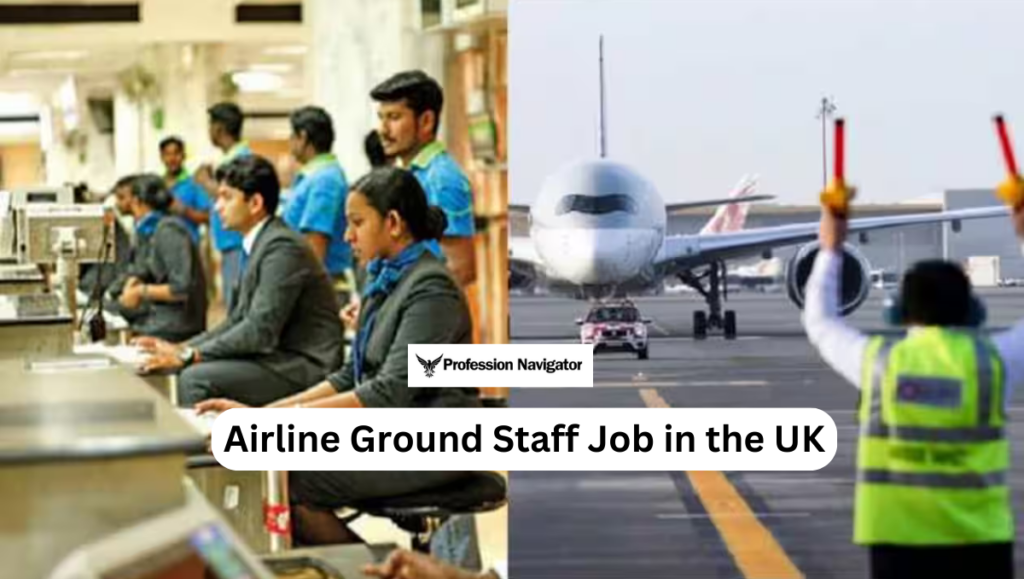Airline Ground Staff Job in the UK
Airline ground staff are the backbone of the aviation industry, ensuring that operations run smoothly on the ground. They play a vital role in various aspects, from customer service to handling baggage, and their work is important for the efficiency and safety of air travel.
Importance and Demand for Ground Staff in the UK
With the UK being one of the busiest aviation hubs globally, the demand for skilled airline ground staff remains high. The growth in air travel and the expansion of airline services necessitate a robust ground support team, making this a promising career path.
READ ALSO: How to get cabin crew jobs in the UK
Table of Contents
Types of Airline Ground Staff Jobs
Customer Service Agents
Customer service agents are the face of the airline at the airport. They assist passengers with check-in procedures, provide information about flights, handle inquiries and complaints, and ensure passengers have a smooth travel experience.
Baggage Handlers
Baggage handlers are responsible for loading and unloading luggage from aircraft. They ensure that luggage is handled carefully and reaches its correct destination. This role requires physical stamina and attention to detail.
Ramp Agents
Ramp agents, also known as ground handlers, manage aircraft on the ground. Their duties include directing planes to and from gates, operating ground service equipment, and ensuring safety protocols are followed during aircraft turnaround.
Ticketing Agents
Ticketing agents manage reservations, issue boarding passes and handle ticketing transactions. They work at the airport counters and sometimes handle additional responsibilities such as upgrading tickets and dealing with overbooked flights.
Operations Agents
Operations agents coordinate the various activities involved in flight operations. They monitor flight schedules, communicate with crew members, and ensure that all pre-flight and post-flight activities are completed efficiently.
Qualifications and Skills Required
Educational Requirements
To become an airline ground staff member, a high school diploma or equivalent is typically required. Some positions may prefer or require further education, such as a degree or diploma in travel and tourism or customer service.
Essential Skills
Communication Skills
Effective communication is crucial for interacting with passengers and colleagues. Clear and courteous communication ensures smooth operations and a positive passenger experience.
Teamwork
Ground staff work as part of a larger team, and cooperation is essential for the efficient handling of tasks and problem-solving.
Problem-Solving
The ability to think on your feet and resolve issues promptly is vital, especially in a dynamic and fast-paced environment like an airport.
Physical Fitness
Certain roles, such as baggage handling and ramp agent positions, require physical strength and stamina to manage heavy lifting and extensive periods of standing or walking.
How to Apply for Airline Ground Staff Jobs
Job Search Strategies
Online Job Portals
Websites like Indeed, Reed, and Glassdoor list numerous airline ground staff vacancies. Setting up job alerts can help you stay updated on new opportunities.
Airline Websites
Most airlines have a dedicated careers section on their websites where they post job openings. Regularly checking these sites can give you a direct line to available positions.
Recruitment Agencies
Specialized recruitment agencies can also help you find airline ground staff jobs. They often have exclusive listings and can assist with the application process.
Crafting a Winning CV
Your CV should highlight your relevant experience, skills, and qualifications. Tailor your CV for each application, emphasizing the skills that match the job description. Include any relevant certifications and training.
Writing a Cover Letter
A strong cover letter can set you apart from other candidates. It should express your enthusiasm for the role, outline your relevant experience, and demonstrate your understanding of the job requirements.
Preparing for Interviews
Prepare for interviews by researching the airline and understanding the role’s responsibilities. Practice common interview questions and be ready to discuss your experience, skills, and why you are a good fit for the position.
Training and Certifications
Pre-Employment Training
Many airlines provide pre-employment training to new hires. This training covers essential skills and knowledge needed for the job, including customer service, safety procedures, and specific operational tasks.
On-the-Job Training
On-the-job training is crucial for gaining practical experience. It allows new employees to learn from experienced staff and get hands-on experience in their roles.
Relevant Certifications
IATA Certification
The International Air Transport Association (IATA) offers various certifications that can enhance your qualifications. These certifications cover areas like passenger service, airport operations, and safety management.
First Aid Certification
First aid certification is often required, as it equips you with the skills to handle medical emergencies at the airport.
Work Environment and Conditions
Typical Work Environment
Airline ground staff work in diverse settings, including airport terminals, baggage handling areas, and on the tarmac. The environment can be fast-paced and sometimes stressful, requiring staff to be alert and responsive at all times.
Shift Patterns and Hours
Ground staff typically work in shifts, as airports operate 24/7. This can include early mornings, late nights, weekends, and holidays. Flexibility is essential in this role.
Physical Demands
Certain roles, such as baggage handlers and ramp agents, require physical effort, including lifting heavy luggage and operating machinery. Physical fitness and endurance are crucial.
Safety Considerations
Safety is paramount in the aviation industry. Ground staff must adhere to strict safety protocols to ensure the well-being of passengers and colleagues. This includes handling hazardous materials and following emergency procedures.
Salary and Benefits
Average Salary Range
The salary for airline ground staff in the UK varies based on the role and experience. On average, salaries range from £18,000 to £25,000 per year. More specialized or senior positions can command higher salaries.
Additional Benefits
Travel Perks
Many airlines offer travel benefits to their employees, including discounted or free flights for themselves and their families.
Health Insurance
Comprehensive health insurance plans are often part of the employment package, covering medical, dental, and vision care.
Retirement Plans
Pension schemes and retirement plans are typically offered, helping employees secure their financial future.
Career Advancement Opportunities
Internal Promotions
Airlines often promote from within, offering opportunities for career growth. Performance and experience can lead to promotions to supervisory or managerial positions.
Further Education and Training
Pursuing further education and professional development can enhance your career prospects. Specialized training programs and certifications can open doors to advanced roles within the industry.
Networking within the Industry
Building a network within the aviation industry can be beneficial. Attending industry events, joining professional associations, and connecting with colleagues can provide valuable career opportunities and insights.
Challenges and Rewards of the Job
Common Challenges
Stressful Situations
The fast-paced nature of airport operations can be stressful, especially during peak travel times or in the event of flight delays and cancellations.
Physical Strain
Roles that involve physical labor, such as baggage handling, can be physically demanding and require good fitness levels.
Rewards and Job Satisfaction
Despite the challenges, many ground staff find their roles rewarding. Helping passengers have a positive travel experience, working in a dynamic environment, and the potential for career growth contribute to job satisfaction.
Personal Stories and Case Studies
Success Stories from Ground Staff
Hearing from those who have succeeded in this career can be inspiring. For instance, John, a customer service agent, started his career with no prior experience in aviation. Through dedication and continuous learning, he advanced to a supervisory role within five years.
Day in the Life of a Ground Staff Member
A typical day for a ground staff member can vary widely depending on the role. For example, Sarah, a ramp agent, begins her shift with a safety briefing, followed by directing aircraft to their gates, loading baggage, and ensuring that safety protocols are adhered to throughout her shift.
Expert Insights
Interviews with Industry Experts
Interviews with seasoned professionals can provide valuable insights. For instance, Jane, a veteran operations manager, emphasizes the importance of continuous learning and staying updated with industry developments to excel in this field.
Advice from Experienced Ground Staff
Experienced ground staff recommend staying patient, developing strong communication skills, and being adaptable to handle the diverse challenges that come with the job.
Future Trends in Airline Ground Staff Jobs
Technological Advancements
Technology is transforming the aviation industry. Automation, AI, and advanced software systems are streamlining operations, making it essential for ground staff to be tech-savvy and adaptable to new tools.
Impact of Sustainability Initiatives
Sustainability is becoming a significant focus in aviation. Airlines are adopting eco-friendly practices, which ground staff need to be aware of, including waste management and supporting the use of sustainable materials.
Future Demand Predictions
The demand for ground staff is expected to remain strong, driven by the continuous growth in air travel. However, roles may evolve with technological advancements and changing passenger needs.
FAQs about Airline Ground Staff Jobs
What are the typical duties of an airline ground staff member?
Typical duties include assisting passengers, handling baggage, managing aircraft on the ground, and ensuring safety and efficiency in airport operations.
How can I improve my chances of getting hired?
Gaining relevant experience, obtaining necessary certifications, and demonstrating strong customer service skills can improve your chances of getting hired.
What are the key skills required for this job?
Key skills include communication, teamwork, problem-solving, and physical fitness.
What kind of training will I need?
Training often includes pre-employment and on-the-job training, along with certifications in areas like first aid and airport operations.
Are there opportunities for career growth?
Yes, there are opportunities for career growth through internal promotions, further education, and professional development.
What are the working hours like?
Working hours are typically in shifts, including early mornings, late nights, weekends, and holidays.
How much can I expect to earn?
Salaries range from £18,000 to £25,000 per year, with potential for higher earnings in specialized or senior roles.
What are the main challenges of the job?
Challenges include handling stressful situations, physical strain, and adhering to strict safety protocols.
Conclusion
Recap of Key Points
Pursuing a career as airline ground staff in the UK offers a dynamic and rewarding opportunity. With various roles available, from customer service to operations, there is something for everyone. Essential skills, relevant training, and a proactive approach to job applications can enhance your chances of success.
Encouragement to Pursue a Career in Airline Ground Staff
If you enjoy working in a fast-paced environment, helping people, and being part of the aviation industry, a career as an airline ground staff could be the perfect fit for you. With opportunities for growth and numerous benefits, it’s a career path worth considering.



